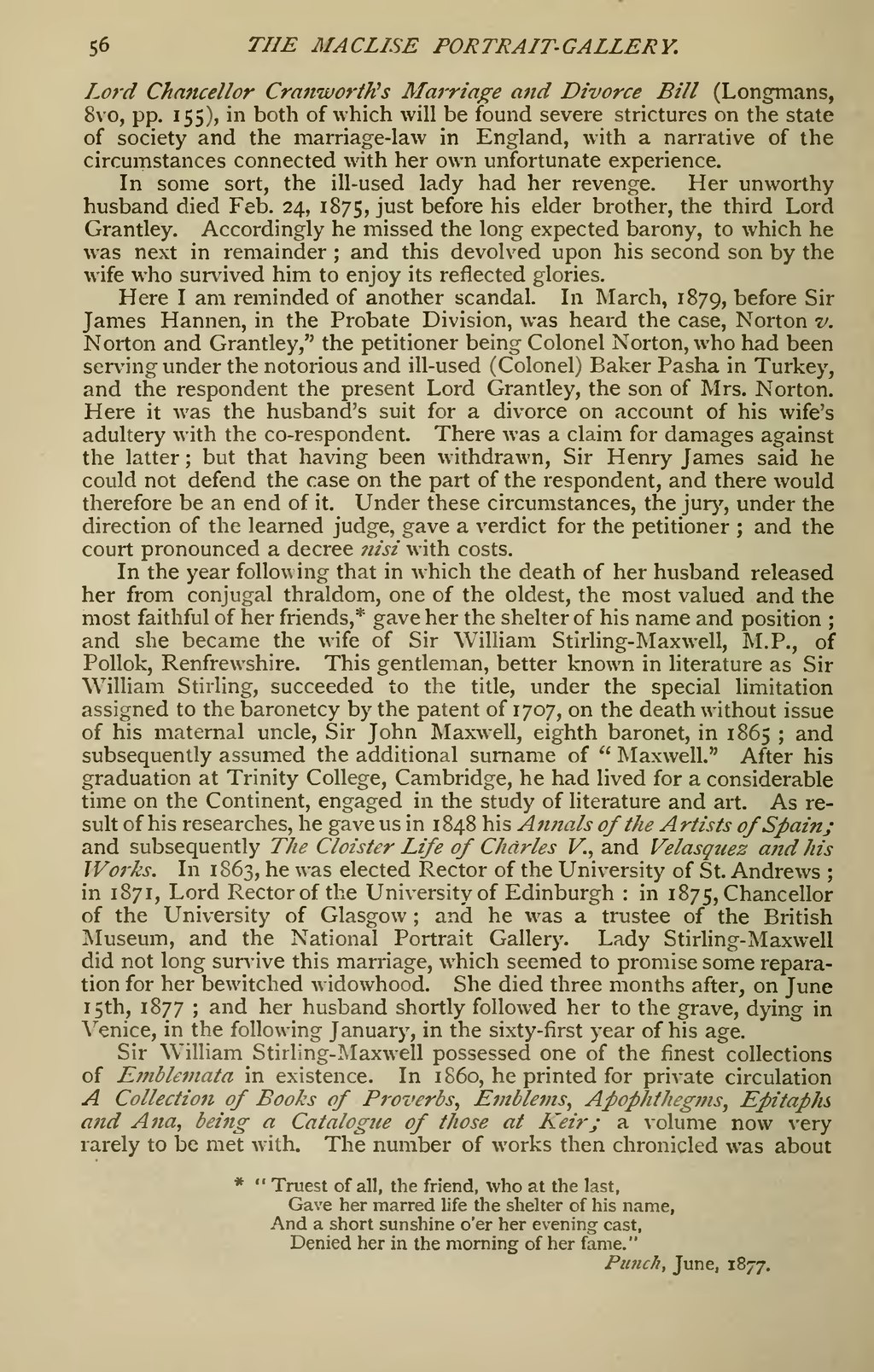Lord Chancellor Cranworth's Marriage and Divorce Bill (Longmans, 8vo, pp. 155), in both of which will be found severe strictures on the state of society and the marriage-law in England, with a narrative of the circumstances connected with her own unfortunate experience.
In some sort, the ill-used lady had her revenge. Her unworthy husband died Feb. 24, 1875, just before his elder brother, the third Lord Grantley. Accordingly he missed the long expected barony, to which he was next in remainder; and this devolved upon his second son by the wife who survived him to enjoy its reflected glories.
Here I am reminded of another scandal. In March, 1879, before Sir James Hannen, in the Probate Division, was heard the case, Norton v. Norton and Grantley," the petitioner being Colonel Norton, who had been serving under the notorious and ill-used (Colonel) Baker Pasha in Turkey, and the respondent the present Lord Grantley, the son of Mrs. Norton. Here it was the husband's suit for a divorce on account of his wife's adultery with the co-respondent. There was a claim for damages against the latter; but that having been withdrawn, Sir Henry James said he could not defend the case on the part of the respondent, and there would therefore be an end of it. Under these circumstances, the jury under the direction of the learned judge, gave a verdict for the petitioner; and the court pronounced a decree nisi with costs.
In the year following that in which the death of her husband released her from conjugal thraldom, one of the oldest, the most valued and the most faithful of her friends,[1] gave her the shelter of his name and position; and she became the wife of Sir William Stirling-Maxwell, M.P., of Pollok, Renfrewshire. This gentleman, better known in literature as Sir William Stirling, succeeded to the title, under the special limitation assigned to the baronetcy by the patent of 1707, on the death without issue of his maternal uncle. Sir John Maxwell, eighth baronet, in 1865; and subsequently assumed the additional surname of " Maxwell." After his graduation at Trinity College, Cambridge, he had lived for a considerable time on the Continent, engaged in the study of literature and art. As result of his researches, he gave us in 1848 his Annals of the Artists of Spain; and subsequently The Cloister Life of Charles V., and Velasquez and his Works. In 1863, he was elected Rector of the University of St. Andrews; in 1871, Lord Rector of the University of Edinburgh: in 1875, Chancellor of the University of Glasgow; and he was a trustee of the British Museum, and the National Portrait Gallery. Lady Stirling- Maxwell did not long survive this marriage, which seemed to promise some reparation for her bewitched widowhood. She died three months after, on June 15th, 1877; and her husband shortly followed her to the grave, dying in Venice, in the following January, in the sixty-first year of his age.
Sir William Stirling-Maxwell possessed one of the finest collections of Emblemata in existence. In 1860, he printed for private circulation A Collection of Books of Proverbs, Emblems, Apophthegms, Epitaphs and Ana, being a Catalogue of those at Keir; a volume now very rarely to be met with. The number of works then chronicled was about
- ↑
"Truest of all, the friend, who at the last,
Gave her marred life the shelter of his name,
And a short sunshine o'er her evening cast,
Denied her in the morning of her fame."
Punch, June, 1877.
